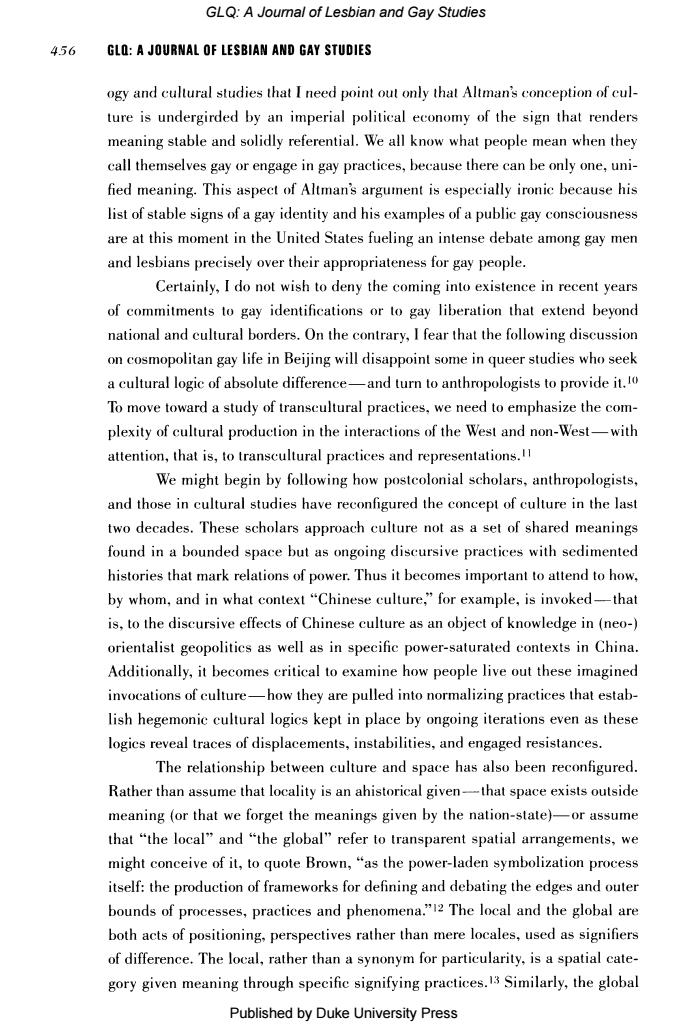正在加载图片...

GLQ:A Joumal of Lesbian and Gay Studies 4.56 GLQ:A JOURNAL OF LESBIAN AND GAY STUDIES ogy and cultural studies that I need point out only that Altman's conception of cul- ture is undergirded by an imperial political economy of the sign that renders meaning stable and solidly referential.We all know what people mean when they call themselves gay or engage in gay practices,because there can be only one,uni- fied meaning.This aspect of Altman's argument is especially ironic because his list of stable signs of a gay identity and his examples of a public gay consciousness are at this moment in the United States fueling an intense debate among gay men and lesbians precisely over their appropriateness for gay people. Certainly,I do not wish to deny the coming into existence in recent years of commitments to gay identifications or to gay liberation that extend beyond national and cultural borders.On the contrary,I fear that the following discussion on cosmopolitan gay life in Beijing will disappoint some in queer studies who seek a cultural logic of absolute difference-and turn to anthropologists to provide it.Io To move toward a study of transcultural practices,we need to emphasize the com- plexity of cultural production in the interactions of the West and non-West-with attention,that is,to transcultural practices and representations.1 We might begin by following how postcolonial scholars,anthropologists, and those in cultural studies have reconfigured the concept of culture in the last two decades.These scholars approach culture not as a set of shared meanings found in a bounded space but as ongoing discursive practices with sedimented histories that mark relations of power.Thus it becomes important to attend to how, by whom,and in what context "Chinese culture,"for example,is invoked-that is,to the discursive effects of Chinese culture as an object of knowledge in (neo-) orientalist geopolitics as well as in specific power-saturated contexts in China. Additionally,it becomes critical to examine how people live out these imagined invocations of culture-how they are pulled into normalizing practices that estab- lish hegemonic cultural logics kept in place by ongoing iterations even as these logics reveal traces of displacements,instabilities,and engaged resistances The relationship between culture and space has also been reconfigured. Rather than assume that locality is an ahistorical given-that space exists outside meaning (or that we forget the meanings given by the nation-state)-or assume ihat“the local'”and“the global”refer to transparent spatial arrangements.,we might conceive of it,to quote Brown,"as the power-laden symbolization process itself:the production of frameworks for defining and debating the edges and outer bounds of processes,practices and phenomena."12 The local and the global are both acts of positioning,perspectives rather than mere locales,used as signifiers of difference.The local,rather than a synonym for particularity,is a spatial cate- gory given meaning through specific signifying practices.13 Similarly,the global Published by Duke University Press456 GLQ: A JOURNAL OF LESBIAN AND GAY STUDIES ogy and cultural studies that I need point out only that Altman’s conception of culture is undergirded by an imperial political economy of the sign that renders meaning stable and solidly referential. We all know what people mean when they call themselves gay or engage in gay practices, because there can be only one, unified meaning. This aspect of Altman’s argument is especially ironic because his list of stable signs of a gay identity and his examples of a public gay consciousness are at this moment in the United States fueling an intense debate among gay men and lesbians precisely over their appropriateness for gay people. Certainly, I do not wish to deny the coming into existence in recent years of commitments to gay identifications or to gay liberation that extend beyond national and cultural borders. On the contrary, I fear that the following discussion on cosmopolitan gay life in Beijing will disappoint some in queer studies who seek a cultural logic of absolute difference-and turn to anthropologists to provide it.l0 To move toward a study of transcultural practices, we need to emphasize the complexity of cultural production in the interactions of the West and non-West-with attention, that is, to transcultural practices and representations. 11 We might begin by following how postcolonial scholars, anthropologists, and those in cultural studies have reconfigured the concept of culture in the last two decades. These scholars approach culture not as a set of shared meanings found in a bounded space but as ongoing discursive practices with sedimented histories that mark relations of power. Thus it becomes important to attend to how, by whom, and in what context “Chinese culture,” for example, is invoked-that is, to the discursive effects of Chinese culture as an object of knowledge in (neo-) orientalist geopolitics as well as in specific power-saturated contexts in China. Additionally, it becomes critical to examine how people live out these imagined invocations of culture- how they are pulled into normalizing practices that establish hegemonic cultural logics kept in place by ongoing iterations even as these logics reveal traces of displacements, instabilities, and engaged resistances. The relationship between culture and space has also been reconfigured. Rather than assume that locality is an ahistorical given- that space exists outside meaning (or that we forget the meanings given by the nation-state)-or assume that “the local” and “the global” refer to transparent spatial arrangements, we might conceive of it, to quote Brown, “as the power-laden symbolization process itself: the production of frameworks for defining and debating the edges and outer bounds of processes, practices and phenomena.”’Z The local and the global are both acts of positioning, perspectives rather than mere locales, used as signifiers of difference. The local, rather than a synonym for particularity, is a spatial category given meaning through specific signifying practices.Iq’3 Similarly, the global GLQ: A Journal of Lesbian and Gay Studies Published by Duke University Press